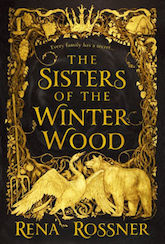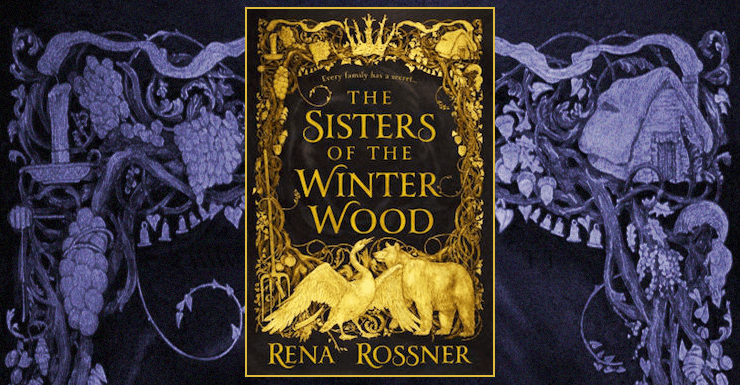Fantasy is frequently dominated by Christian mysticism, by the inspirations of European medieval myth-making, and by the enduring influence of early modern Western European colonialism. It’s always refreshing, then, when a fantasy novel draws on explicitly anti-colonial (the oeuvre of N.K. Jemisin), Muslim (Throne of the Crescent Moon, Saladin Ahmed) or Jewish (The Golem and the Jinni, Helene Wecker) inspirations and cultural topoi.
The Sisters of the Winter Wood is Rena Rossner’s debut novel. A retelling of Christina Rossetti’s “Goblin Market,” with added influences from Ukrainian and Russian folktales of swan-maidens and bear-men, it sets itself in the first decade of the 20th century in the Transnistrian town of Dubossary and concerns itself deeply with Jewishness and Jewish cultural life in small-town Eastern Europe.
The main protagonists, eighteen-year-old Liba and sixteen-year-old Laya, are the daughters of the very learned son of a Hasidic rabbi (from a family lineage that can shapeshift into bears) and an aristocratic shapeshifting swan-maiden, whose love for each other estranged them both from their families and brought the swan-maiden to convert to Judaism. (By reason of that conversion, among others, the family isn’t entirely integrated into their current Jewish community.) Liba has inherited her father’s bear-shifting, she is beginning to learn, while Laya takes after her mother’s side, and is starting to feel restless, itchy, as though she might sprout feathers and fly away.
When their mother and father are called away to attend grandfather-rabbi’s deathbed in the hopes of effecting a familial reconciliation, the two girls are left alone for a time. It is just at this moment that a troupe of roving fruit-sellers (the brothers Hovlin) arrive in town, bringing with them irresistible fruit and anti-Semitic agitation. Despite the anti-Semitism of the Hovlins, Laya is seduced by the fruit and the kisses of the strangely beautiful boy who offers it to her. Liba, meanwhile, is distracted both by her attraction to butcher’s-son Dovid and by her fear that shifting into a bear may cause her to become violent and beastlike.
The Sisters of the Winter Wood has a promising premise and a compelling setting. I wish I could have enjoyed it more. Unfortunately, a couple of things stood in the way of my wholehearted enjoyment.
The novel’s viewpoint alternates between the two sisters, with a narrative recounted in the first person, but while Liba’s section of the book is recounted in prose, Laya’s is told in … honestly, I don’t know? I suspect the author believes it to be prose poetry of approximately six to eight words per line with randomly inserted mid-sentence line-breaks. Laya’s narrative made my head hurt. Here is an example, from page 200 of my review copy:
Did you sleep well?
he says when he sees me.
Mmhmmm, I nod.
It is the only sound
I can make.
My lips are sore.
I feel my cheeks flush.
On its own, as a short excerpt, this is a harmless quirk. Even, perhaps, appealing. But there are pages and pages written in this style, with no line going on longer than seven or so words. It induced in me first teeth-grinding impatience, then growing snark, then a throbbing headache, and finally overwhelming despair. There doesn’t seen to be any particular reason for this stylistic choice, other than “the author appears to believe that random line breaks make it cool and poetic, appropriate for a beautiful and impulsive swan-maiden girl.” Perhaps it is meant to indicate that Laya is neuroatypical? But there are less headache-inducing ways to signal that. And also clearer ways, since I came to no conclusion either way as to whether that was, in fact, Rossner’s intent. It’s not good prose, and it’s not good poetry. (I can forgive a lot for good poetry.) But I’m going to stake out a position on the hill of “random line breaks and short lines do not constitute poetry.” If you’re going to write a goodly proportion of your novel with the intent to be poetic, I feel, you should either opt for the constraints of formal blank verse or be an amazing poet.
In the absence of either, I feel—
Friends don’t let
friends drop random
breaks into the sentence-line.
It may upset
all rhythm.
Line breaks don’t (free) verse make:
not good verse, that’s the mistake.
It’s gorgeously detailed, gleaming fine,
but let’s be frank, not pretend, not rake
swan-feathers over fragrant bear-scat.
What did she even intend,
doing that?
Now that I’ve vented my bile over this particular stylistic issue, let us return to discussing other matters.
Buy the Book


The Sisters of the Winter Wood
This is in many respects an intensely domestic book, concerned with social relations in small communities: both Liba and Laya are of marriageable age and feeling their way into the transition to adulthood—which is cast, by both the narrators and the narrative itself, as, for women, a married state. In the hands of a different author, the theme of transformation (girl to swan, girl to bear, goblin fruit to poisonous addiction or rot, blood to goblin fruit, girl to adult, virgin to sexually active, friendly non-Jewish community to viciously anti-Semitic pogrom-enacting mob) may have found a more integrated—and perhaps more mindfully interrogated—expression, but here one may note that they are present, and overlap in ways which at times support and at times undermine the novel’s explicit concern with sisterhood, natal families, inheritance, and the perils of boys.
(I’m a little disappointed that at least one of the protagonists appears to have never heard of a fairytale before, and thus is inappropriately unwary of strangely beautiful boys offering delicious fruit and addictive kisses. Though the protagonists are teenagers, so perhaps they get a pass on the boys-with-kisses thing.)
The Sisters of the Winter Wood is largely measured in its pacing (one might call it slow), save for those moments where everything happens all at once. It is, perhaps, a promising debut. I wish I’d liked it more, because I really feel the genre needs more fantasy that draws on explicitly Jewish (and Muslim) backgrounds in the face of the pull that Christian soteriological and teleological influences exert on the literature of the fantastic. I hope it finds an audience.
Alas, that audience is not me. Without the poetry, it might have been me. But as it stands—no.
The Sisters of the Winter Wood is available from Redhook.
Liz Bourke is a cranky queer person who reads books. She holds a Ph.D in Classics from Trinity College, Dublin. Her first book, Sleeping With Monsters, a collection of reviews and criticism, was published in 2017 by Aqueduct Press. It was a finalist for the 2018 Locus Awards and is nominated for a Hugo Award in Best Related Work. Find her at her blog, where she’s been known to talk about even more books thanks to her Patreon supporters. Or find her at her Twitter. She supports the work of the Irish Refugee Council, the Transgender Equality Network Ireland, and the Abortion Rights Campaign.










